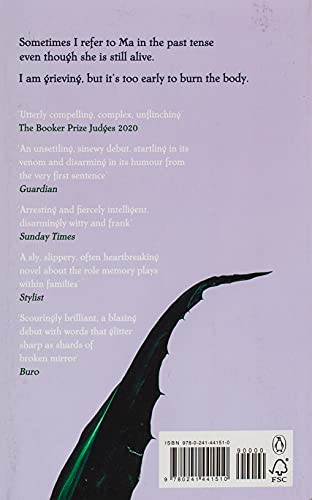




Burnt Sugar: Shortlisted for the Booker Prize 2020
S**
Beautiful
I couldn’t put the book down. A beautiful story that is frighteningly so realistic with many relatable experiences. I can definitely see this becoming a movie one day
G**R
Life as dysfunctional devastation
Antara’s life experience is harsh and hostile. She is even named in opposition to her mother Tara. Tension is everywhere, characterising all her relationships and all her life. Her father leaves and remarries, the ashram demagogue Baba dominates and exploits women, Reza is totally uncommitted as a lover indiscriminately so between Tara and Antara, the boarding school headteacher abuses her pupils, her marriage to Dilip is merely functional, the birth of her own baby disorienting, even devastating. Her wider family is pre-occupied with its own agenda and interpretations, and fusses over her without empathy. Her friend Purvi is lost to her, absorbed in a rich shallow world. Only Kali Mata, as a fellow sufferer can embrace Antara.This is a dire interpretation of life, but perhaps one which is too often the case. The strain of her mother’s dementia is yet more grievous, a suffering which is increasingly widely shared. Avni Doshi’s observations are perceptive. Is humanity doomed to such inevitability, or is virtue a cognitive option?
D**Y
Boring
Found this story extremely boring. I have been to India many times and read many excellent Indian authors but found this story so confusing and disappointing. .i cannot believe it is long listed for the Booker Prize!
R**F
Intense and Emotional
In Burnt Sugar, our narrator Antara is caring for her mother, Tara, who has dementia. Antara describes not just the impact of the dementia on Tara and herself, but also the life that the two of them have led up to that point.The result is intensely emotional. Tara chooses to leave her unhappy, oppressive marriage to join a guru at an Ashram, taking her daughter with her. She neglects her daughter to focus on her own needs and desires, particularly her obsession with the enigmatic guru, "Baba". In this, she is just like the other Ashram residents, who engage in a range of bizarre behaviour to service their attachment.Meanwhile, Antara suffers. Tara ignores her, even forgetting to feed her. She finds liberation, indulges her whims, but at Antara's expense. When "Baba" dies, she lashes out, calling Antara a "fat little bitch". She lives on the streets as a beggar, and it is only in her adult life that Antara is able to get back on track, entering her own flawed marriage and then taking in her mother when her dementia makes it necessary.The key conflict of the book, however, is not that between Antara and her mother. Rather, it is the conflict between the obligations of being a parent and the desire to live your own indulgences. While the reader can never get away from Tara's selfishness, one also feels Tara's suffocation and frustration. Parenthood isn't for her, just as her marriage wasn't what she expected.That is reflected in how Antara is denied her moment of reckoning with her Mother. Between the dementia and Tara's intransigence, there is certainly no apology. "There’s nothing wrong with thinking about oneself," Tara says, in a moment of lucidity. The troubling thing is she may not be completely wrong.
T**R
A chaotic relationship between mother and daughter.
On the Women’s Prize Long List for 2021 and on my TBR list since summer (again), Burnt Sugar sounded an intense and heart wrenching read.I really enjoyed the way Avni Doshi carefully builds an immersive environment through smells, food, colour and materials throughout the book.Antara (an Artist) and Tara (the wild and unruly mother) have a difficult mother-daughter relationship, stemming from Antara’s youth. When she was young, her mum ran away and joined an ashram (spiritual monastery), out of loneliness and boredom as an escape from her marriage.The story flits back and forth between childhood and present day as Tara’s dementia gets progressively worse. The dementia amplifies her already complex personality and Antara is faced with the task of looking after a mother who never really cared for her.A deep hatred and resentment builds between them, despite the love they feel for one another, peaking in Antara’s teens. This has a knock on effect on her relationship with her husband and others within her life - leaving her feel like she’s 2 different people, one of which is angry and violent, all shaped by her experiences and the impact of her mother’s relationships on her.There is a mystery man at the centre of her art which has shaped her career to date. As the story goes on, this person is revealed and the true complex nature of this relationship comes to light; unpacking years of emotions, experiences and secrets between her, her mother and her husband.Coming full circle in the motherhood cycle when Antara becomes a mother herself; when you see that perhaps her mother and now her have experienced post-natal depression but the story leaves you guessing if it’s all reality or if in fact some parts are not as they seem.
L**A
A perfect antithesis for a woke world
From the opening paragraph to the last sentence this is the antithesis of the canonised mother-daughter relationship and it is perfectly written in all its toxic glory. A masterpiece. I loathed and empathised with both protagonists equally and the allegory that you get the relationship you deserve is exquisitely delivered.
Trustpilot
3 weeks ago
1 month ago